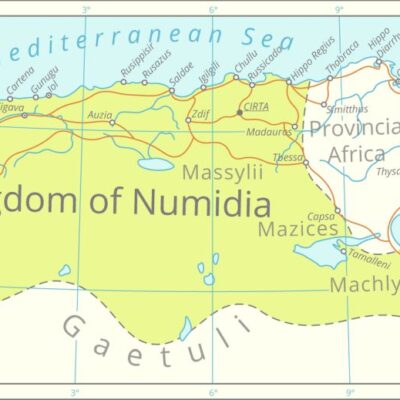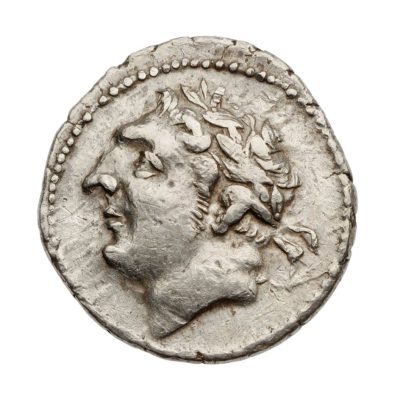Numidia, a land located in present-day Algeria and part of Tunisia, was one of the most important Berber areas in ancient times. Inhabited by Berber tribes, Numidia has experienced changing fortunes in its relations with its powerful neighbour – Rome for centuries. Its inhabitants, valued as warriors and horsemen, became both invaluable allies and dangerous opponents for Rome.
Numidia began to emerge as a separate political entity during the Punic Wars between Rome and Carthage (3rd century BCE). At that time, the Berber tribes of the Massyls and Masaesyls, fighting among themselves for influence, initially allied with Carthage, but eventually chose Rome as a strategic ally.
The most famous ruler of Numidia was Massinissa (ca. 238 – ca. 148 BCE), who initially cooperated with Carthage, but later switched to Rome, which significantly contributed to his successes. Massinissa, supported by the Romans, united Numidia, creating a strong and prosperous kingdom. In exchange for military and political assistance, Rome recognized Masinissa as its ally, and Numidia became one of the empire’s key regional partners.
After the death of Masinissa, Numidia did not avoid internal divisions. In 112 BCE a conflict broke out that went down in history as the Jugurthine War (111-105 BCE). Jugurtha, grandson of Masinissa, tried to maintain full control over the kingdom, which provoked opposition from Rome. This ruler, a master of political intrigue and military commander, perfectly exploited the weaknesses of the Romans, especially their susceptibility to corruption, to secure his interests.
Despite numerous diplomatic and military efforts, Jugurtha ultimately lost the war with the Roman legions, and his defeat led to the collapse of Numidia’s independence.
After the fall of Jugurtha, Numidia gradually became part of the Roman empire. During the civil war between Caesar and Pompey, the Numidian king Juba I supported Pompey; after Julius Caesar’s victory, Numidia became the Roman province of Africa Nova.
Romans took full control of this strategically important region, which was rich in natural resources and served as a key area for trade and agriculture. The Roman administration built a network of roads, cities and forts in Numidia, and these lands became an important supplier of grain, oil and other raw materials.
Rulers and nobles from Numidia who accepted Roman domination often took Roman citizenship and their children were educated in Rome. In this way, the local elite gradually Romanized itself, which, however, did not mean complete assimilation of the Berbers. Many still retained their distinctiveness and customs, and nomadic tribes that lived in more distant areas were less susceptible to Roman influence.
Berbers were valuable warriors and often served in the Roman army as auxilia – auxiliary troops of the imperial army. Known for their horsemanship and guerrilla fighting skills, the Berbers played an important role in protecting the Roman borders in Africa and other regions of the empire. They were particularly effective in operations in difficult, desert terrain.
Although many Berbers cooperated with Rome, there were many revolts against foreign authority. Particularly famous is the uprising that broke out under the leadership of leaders such as Tacfarinas (17–24 CE). The uprising was guerrilla in nature and lasted for years, forcing the Romans to mobilize and make efforts to defend their African possessions.








